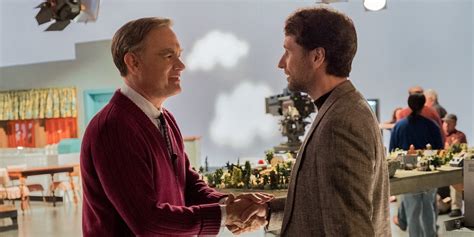Eye For Film >> Movies >> A Beautiful Day In The Neighborhood (2019) Film Review
A Beautiful Day In The Neighborhood
Reviewed by: Anne-Katrin Titze

Tom Hanks masters the art of slowing us down the way Mister Rogers did. The moments of calm, silence, and reflection are the most powerful in the film - as if in a realisation that tapping into our common humanity had become a long forgotten magic trick from the old century, albeit one we desperately need for survival. In 2018, Morgan Neville’s magnificent and devastatingly timely documentary Won't You Be My Neighbor? was a big success, reminding us of Fred Rogers’ humanist ideas and emotional learning.
Based on Tom Junod's 1998 Esquire Fred Rogers profile, Can You Say…Hero?, Marielle Heller's A Beautiful Day In The Neighborhood, screenplay by Micah Fitzerman-Blue and Noah Harpster, braids the fictional family story of journalist Lloyd Vogel (Matthew Rhys) together with his life-changing encounter with the iconic children's program host.

You cannot have too much Mister Rogers, the film shows. There is something so disarming, generous, wise and wild about his point of view, be it the real Fred Rogers in his programs, interviews and other archival footage, or in the shape of Tom Hanks’s loving interpretation of him. Each Rogers encounter takes the rug out from under the mainstream complacency in how human interactions are supposed to work. Smooth transactions, convenience and the motto of do-not-disturb are wreaking unfixable havoc every day.
Lloyd's attitude towards work and private life is bound to his estranged relationship with his father Jerry (Chris Cooper, Mister Laurence in Greta Gerwig’s Little Women), who years ago abandoned Lloyd's dying mother. When Jerry pops up at Lloyd's sister's wedding and performs a drunken love song in an attempt to reconnect, hell opens up again, not only for Lloyd, but also for his wife Andrea (Susan Kelechi Watson) and their baby.
Jerry, who is dying, wants to introduce his children to Dorothy (Wendy Makkena), the woman he spent the last 15 years with. Dressed in low-cut animal prints and full makeup, she hugs and cradles and protects her man at any occasion. More than once her embrace resembles a Pietà. It is clear that she did her best to try to be his everything. Instead of competing with Jerry's children, she seems to want them to reconcile.
Lloyd starts out looking down on Mister Rogers, as if being assigned to profile the children’s program host for Esquire was beneath him. On the other hand, his wife is worried, what he might uncover when taking a closer look at the man with the zip-up cardigans. “Please don’t ruin my childhood,” she pleads.
How daring it seems - now more than ever, when screens make so many people terrified of spontaneous conversation - to ask a stranger how they feel. “Did you have a special friend growing up?” is the magical question asked by Tom Hanks’ Mister Rogers that unlocks in Lloyd the memory of his little stuffed toy, a rabbit, who turns out to be the threshold guardian for the journey to come. What began with the inquiry about swapping out the puppets (Daniel Striped Tiger and King Friday the 13th had a long run) in his show, produces the baffled response in Rogers that exposes the silliness of such a question - because the more ratty and beat-up they get, don’t you love them even more?
The memory of Old Rabbit as the open sesame and Tom Hanks careful performance manages to walk the fine line, whereas some of the family scenes, despite the actors’ efforts tumble into Hallmark territory kitsch, where unrealistic wish fulfillment rules. The mean are suffering and change their tune suddenly. The dying father, the baby, the stepmom - their motivation crumbles when Mister Rogers isn’t around.
As though the film is still haunted by some of the mean-spiritedness displayed by Melissa McCarthy’s Lee Israel and Richard E Grant’s disreputable Jack Hock in Heller’s Can You Ever Forgive Me?, when they make the prank call to the Crosby Street bookshop owner and have him believe that his pet is trapped in the fire raging in his apartment. Forgiveness is very tricky. Apropos animals, asked if he is a vegetarian, Hanks’s Rogers replies that he can’t eat anything that has a mother.
There is always something constructive you can do “with the mad that you feel” and appreciating what a child is, and not what it could be, are forceful reminders, while a song on the subway will trigger your tears. While Mister Rogers' Neighborhood had programs dedicated to topics like death, divorce, and 9/11, because he knew that children needed help to address these concerns, Heller’s family saga turns sappy in order to end the movie on a happy but false note. What can happen when you really listen to Mister Rogers, is that you are confronted with your own cowardice.
Reviewed on: 08 Jan 2020
















